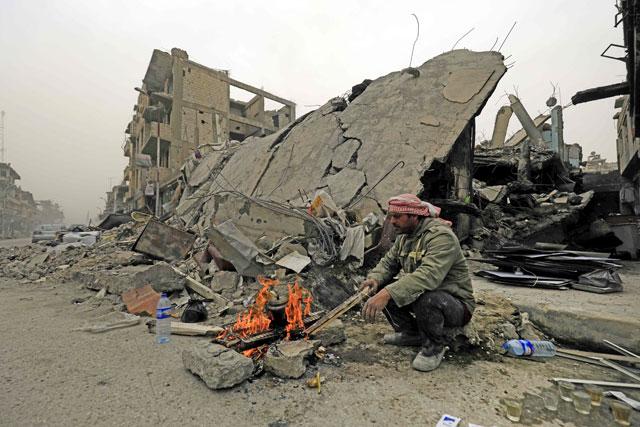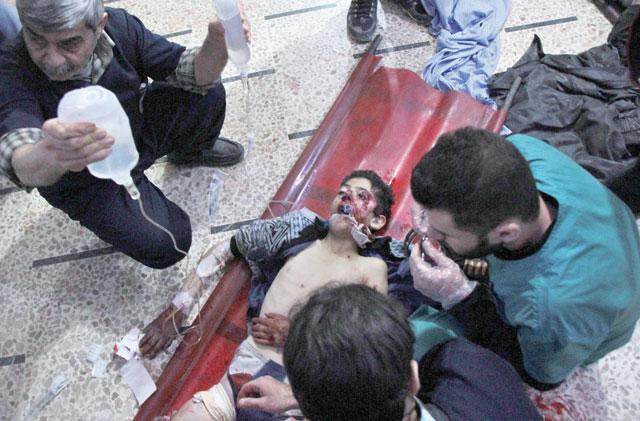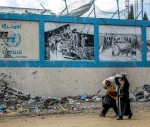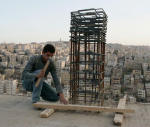You are here
Putin takes lead in Syria peace after battlefield wins
By AFP - Dec 31,2016 - Last updated at Dec 31,2016

Russian President Vladimir Putin holds a sword while listening to explanations from the head of Russian First Channel Konstantin Ernst, during his meeting with the historical action film Viking’s crew, in Moscow, Russia, on Friday (AP photo)
MOSCOW — After turning the tide on the ground in Syria with his country’s military might, Russian President Vladimir Putin is trying to cement his authority by forging an unlikely peace deal.
The Kremlin strongman on Thursday announced a new truce and talks between Damascus and rebel groups, thrusting Moscow into pole position as the conflict’s key broker.
By combining muscle with realpolitik Russia has struck an improbable understanding with Turkey on Syria, filling a vacuum left by the United States that has effectively sidelined the West.
Here is how Russia made itself the main player and what that means now:
Putin on top
When Putin launched Russia’s bombing campaign to back Syrian President Bashar Assad in September 2015, his US counterpart Barack Obama warned that Moscow risked getting stuck in a “quagmire”.
But now the Kremlin has shored up Assad, helped him reclaim the second city of Aleppo and pushed rebel groups into a ceasefire.
“Russia is positioning itself as a mediator between those inside Syria and a mediator between the external actors,” Alexei Malashenko from the Moscow Carnegie Centre told AFP.
Putin has seized the initiative with a combination of ruthlessness and bravado as the US under Obama increasingly moved its focus elsewhere.
Untroubled by public opinion at home, Putin faced down ferocious international criticism of his intervention and the brutal bombardment of Aleppo to help Assad secure his position.
After the major victory on the battlefield, Moscow is pushing from a position of strength for talks expected next month in Astana, the capital of Kazakhstan.
Winning over Turkey
Putin has admitted that the latest truce and agreement to talk are “fragile”, with two earlier attempts by Russia and the US to stop the fighting in Syria collapsing in failure.
But this time Russia has secured a valuable partner whose influence could prove a gamechanger in bringing rebels to the table: Turkey.
“The situation had seemed liked a dead end,” Fyodor Lukyanov, chairman of Council on Foreign and Defence Policy in Moscow, told AFP.
“But the agreement with Turkey changed the balance.”
NATO-member and traditional US ally Ankara has supported those seeking to topple Assad, but now appears to have decided to place other priorities above insisting on change next door.
The two sides have patched up a feud over Ankara’s downing of a Russian fighter jet last year and pushed on much further to seal their cooperation on Syria.
The first step saw the two reach a deal to evacuate fighters and civilians from Aleppo, a face-saving move that allowed Ankara to present a defeat as a diplomatic coup.
Despite denials from Turkey, a broader grand bargain appears to involve Moscow giving Ankara tacit approval for its incursion into Syria against the Daesh terror group militants and Kurdish fighters.
While Turkey officially insists that Assad must go in any peace process, its rhetoric has been noticeably toned down of late.
Meanwhile, unconfirmed reports have surfaced that Russian planes have for the first time struck in the Islamic State-held town of Al Bab in Syria, which is surrounded by Turkish troops.
US out for good?
Washington — and the rest of the West — now finds itself very much on the margins on Syria, due to its own inaction and Russia’s assertiveness.
“President Obama has been a bystander to this carnage...and he is not taken terribly seriously by the people like President Putin,” said Clifford D. May from the US-based Foundation for the Defence of Democracies.
Russia, Iran and Turkey seem to have closed the door on any US involvement in the peace process, but that could change when President-elect Donald Trump replaces Obama next month.
Trump has said he wants to improve Washington’s dire ties with Moscow and focus on fighting Daesh rather than toppling Assad.
If the talks in Astana make progress toward shaping Syria’s future, then Putin may be able to present Trump with a fait accompli and wangle a deal to join forces against Daesh.
Moscow winning the peace?
But many remain sceptical about whether Moscow’s peace push can succeed where years of international efforts have failed.
The future of a resurgent Assad remains a major stumbling block and there is no consensus about how Syria will be governed.
There are also questions over who represents the opposition after its defeat in Aleppo and whether it can be viewed as legitimate.
Simultaneous to announcing the ceasefire, Putin, by announcing a “reduction” in Russian forces, sent a sign that he may be looking to step back from Syria.
This is the second time Moscow has said it was scaling down its operations, having announced in March it was doing so before being forced to build up its firepower again.
“It is most likely a gesture, to show them that we consider the military phase over, now it’s time to agree,” analyst Lukyanov said.
“And if it does not work out then we’ll be back.”
Related Articles
ASTANA — Syria's opposition on Thursday said it was more important "than ever before" that Russia push Bashar Assad's government towards a p
GENEVA — The United Nations will try to revitalise its flagging Syria peace process this week, buoyed by the prospect of hosting a unified o
MOSCOW/ASTANA — Russian-led peace talks on Syria were derailed on Tuesday as rebels backed by Turkey boycotted a third round of meetings in

















